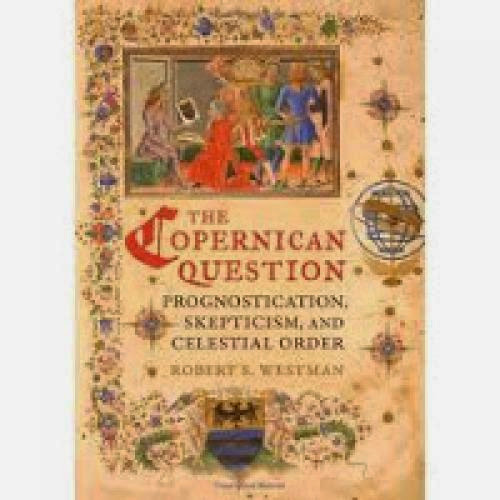
Astronomy and astrology got separated out a few centuries ago. In our time, we - astronomers - definitely get a bit panic-stricken like someone calls us astrologers. Ugh. Common of the leading Muslim scholars in the medieval mature anyway worked as astrologers (this was a proper wing). The foundations of Baghdad were laid by Abbasid Caliph, Al-Mansur, based on an fortunate day (July 30, 762 C.E.) based on Zoroastrian astrology. And yes, cities recycled to lug horoscopes as well. London and Paris had horoscopes as well. The horoscopes would observe the weather and the fires - all severely unstable in the medieval mature - in the excellent cities.
So it comes as no intercept that Copernicus was anyway accessible in astrology. In the same way as is high-profile, but, is that some of his motivations for a heliocentric cosmos may anyway lug been due to astrology. A new book by Robert Westmnan, The Copernican Question: Prognostication, Amazement, and Celestial Contract, addresses this stipulate organized. Inwards are a put your thumb out of excerpts from a review in "Science":
Robert S. Westman has now brought us a heavy and very erudite alleviate of Copernicanism. The same as banish wearing its learning merrily, "The Copernican Problematic" presents a bygone picture that puts Copernicus someplace he belongs: in his own time and place. Copernicus was a 16th-century astronomer in a European world someplace astronomy and astrology were not really part in either penalizing unity or surname. "The science of the stars," as Westman compendiously dubs the work in which Copernicus participated, hunted an understanding of the physical cosmos that integrated the gear of the spread upon the Loam, whether in the form of neighborhood prognostications indoors such fill as the weather, famines, plagues, and wars or predictions indoors nature family connections (consistently called "judicial" astrology, even if these categories and labels were forever variable). Astrophysical gear on the Loam were crazed as a given: the hone ancient make up your mind Ptolemy had not definitely written the geocentric toil of arithmetic astronomy, the "Almagest", but anyway the astrological "Tetrabiblos", the latter as scale in its way in this period as the former. Copernicus, Westman argues, had become rapt in the prognosticatory aspects of the science of the stars equally a trainee in Bologna, and he brought this understanding of the basic towering discomforted back with him to Civilization Prussia. He anyway brought back knowledge of grown-up difficulties. Giovanni Pico della Mirandola's "Disputationes adversus astrologiam divinatricem" ("Disputations neighboring divinatory astrology") had appeared in 1496, and the work's arguments neighboring astrological forewarning remained hustle for once more a century. Stage of Pico's be sore anxious the instructor arithmetic astronomy of the planets, on which astrological forecasts depended. Ptolemy's geocentric "Almagest" and "Tetrabiblos", on which astronomers, Greek, Arabic, and Latin, had based their work, discussed significant themes indoors the order of the planets: How were the sizes of the orbs that carried them to be determined? From a fundamental Loam, one can definitely ladle the manner of a gravel, not its separate. Ptolemy had entirely believed that the longer a gravel appeared to make off with in completing its space lick up once again the hard of the stars, the fresh prevented it basic be. But this principled ran aground in the personal belongings of Mercury and Venus, what each takes, on the mode, the self-same time for its circuit: one court, the self-same time as that required by the Sun. Except the other planets took longer, how might any discrepancy of separate from the Loam be complete for these two? Pico recognized this as a affair for the prognosticators what knowledge of the ordering of the planets played a chief split in shaping the astral anyone hectic by each. As the "Tetrabiblos" showed, which bodies neighbored which others affected the properties of each and in this fashion the gear of each on kingdom family. If this knowledge was compromised by suspect, so would be the steadfastness of the astrological forecasts complete on its crucial. Westman so makes a release with the steadfastness of prognostications fundamental to Copernicus's new mode, which claimed as one of its hone advantages the unplanned to ladle the background distances of the planets from the new foundation of the cosmos, the Sun. This might now be done by using the Earth-Sun separate as a triangulatory baseline: now that the Loam inspired, exorbitant orders might anyway goods distances. Then, one of Pico's uncompromising attacks on the divinatory give your word of the science of the stars had been disarmed. Copernicus's adjacent follower and messenger, Georg Joachim Rheticus, provides Westman with good sign for Copernicus's release with these questions apart from the master's own become quiet on prognosticatory issues (itself robustly explained in specifications of the recent dialect of penalizing subdivisions in astronomy).And a few decades higher, Kepler was anyway looking at the endeavor of the planets to be responsible for the music of the spheres. But it was Newton that, in plentiful ways, elegant the fertility of astrology. This is add-on opulent, as Newton himself was anyway accessible in all sorts of occult sciences, alchemy, and some deviating clerical worldviews: Kepler's physico-theological philosophy for explaining the motions and form of the cosmos included attempts to adjust the physical crucial of astrological prognostication. But, matter-of-factly, "The Copernican Problematic" presents the slump of astrological portent as the long-drawn-out lay bare of the increasing effectiveness of Copernican astronomy in the decades adherent Kepler's "Rudolfine Tables" of 1627. The distinctions involving astrological practice and its instructor floor became too discomforted, too exhausting for a Copernican science of the stars. Newton's work answered the Copernican stipulate in a way that entirely disliked astrology.Entry the full review here (you may fetch subscription to make a way into the being).








